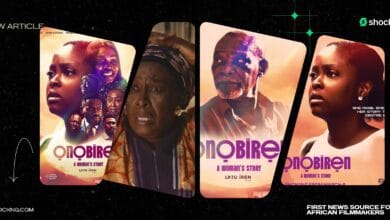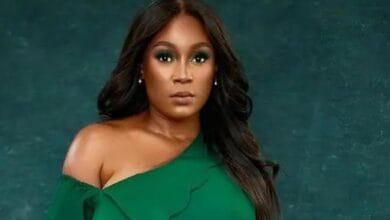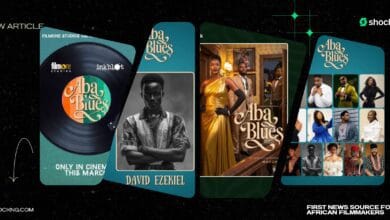The Story⚡
Say Who Die?’s writer-producer Lani Aisida and director Paul Utomi share what it took to bring the dark comedy flick to life on Prime Video.
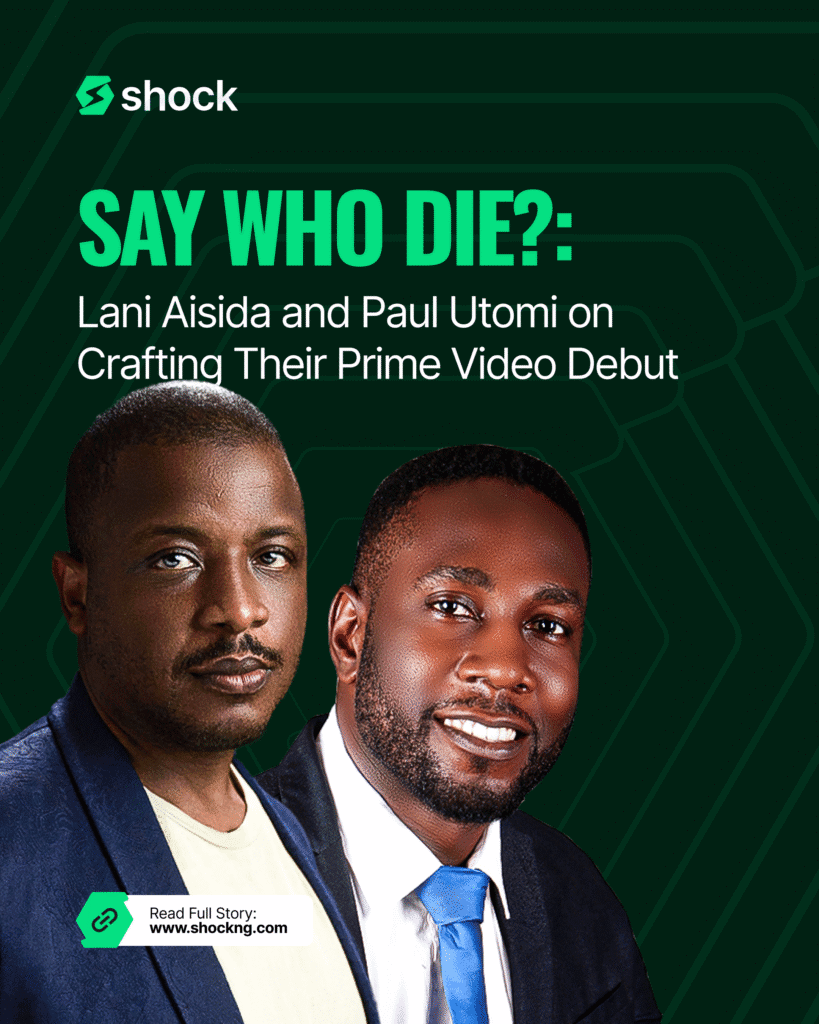
Tell Me More
In this exclusive interview, writer and producer Lani Aisida and director Paul Utomi open up about their creative journey bringing a dark comedy family drama to life on Prime Video. Lani shares how personal experiences, from reflections on identity to the joy and complexity of twin dynamics, shaped both the writing and production process. Meanwhile, Paul reveals how honing his directorial instincts, grounded in real-life observations and an eye for humor within conflict, guided him through a fast-paced shoot under unconventional constraints. Together, they share what it means to make bold storytelling choices, collaborate in close quarters, and chart new territory in Nollywood’s evolving space on a global streaming stage. The flick is produced by Lani Aisida’s production company, African Untold Stories.
Enjoy the interview.
Shock Africa: It’s a pleasure to have the two of you here. We will start with Lani. You mentioned that the twins in the film are inspired by your late aunties. So, how personal did that make the storytelling process for you?
Lani: Not very. It was the names of my aunties, not the stories of my aunties, right? So, it’s not that personal if you think about it from that angle. It’s also a thing of having aunties in my family who are twins, and my mum, who’s also a twin. I just wanted to be able to showcase the nuance of twin relationships. You know how sometimes they can fight, and how people sometimes say that you shouldn’t come between a man and his wife, because if you do, they might eventually use you to make up. It’s almost like that with twins, from my experience. They can fight and hate each other, but you just don’t step between them. It’s a different kind of love.

At some points in the movie, one of the characters, Odion, actually says that she loves her sister in her own kind of way that no one will ever understand, and I feel like in that line, we capture the kind of love we’re trying to exhibit in the film.
Shock Africa: All right, that’s great. Thank you for that. So, this next question is for you, Paul. You’ve worked with quite a couple of actors in your career, but what do you think is quite unique about this one, and what was the moment you were most proud of as the director?
Paul: The twins were really exciting to work with because, aside from this project, they really didn’t have much in the way of film experience. However, they were really willing to learn and listen, and their attitude was basically unimpeachable. I am friends with a lot of the other talents we had on the project; I already had some sort of personal relationship, so it made it easy for me to communicate.
On this project, I would say the fact that we were able to build everything, with all the challenges we had, in basically 11 and a half days, was quite something. The cast and crew did a hell of a job. They made me proud, and I’m even proud right now just thinking about it. What they had to overcome to make it happen. I am also grateful that I got an opportunity to do this with that cast and that crew, and also with Lani. To be able to do something like this with him, which I think is no small feat, is something that will stay with me for the rest of my time on this planet.
Shock Africa: Awesome. Thank you for that, Paul. Lani, this picture blends dark comedy with family drama. What was the inspiration behind this mixing of the genres?
Lani: With me, it’s always been a thing of trying to explore and be better. As a matter of fact, I’ll tell you something. I had just come off writing a show, and one of the critiques I got from that show was that it was a slow build. What I do for self-improvement is listen to criticism from people that I trust and then work on the next project. So, this project was actually one that I went out to work on based on how fast-paced I can write, and that fitted into the genre I was trying to explore.
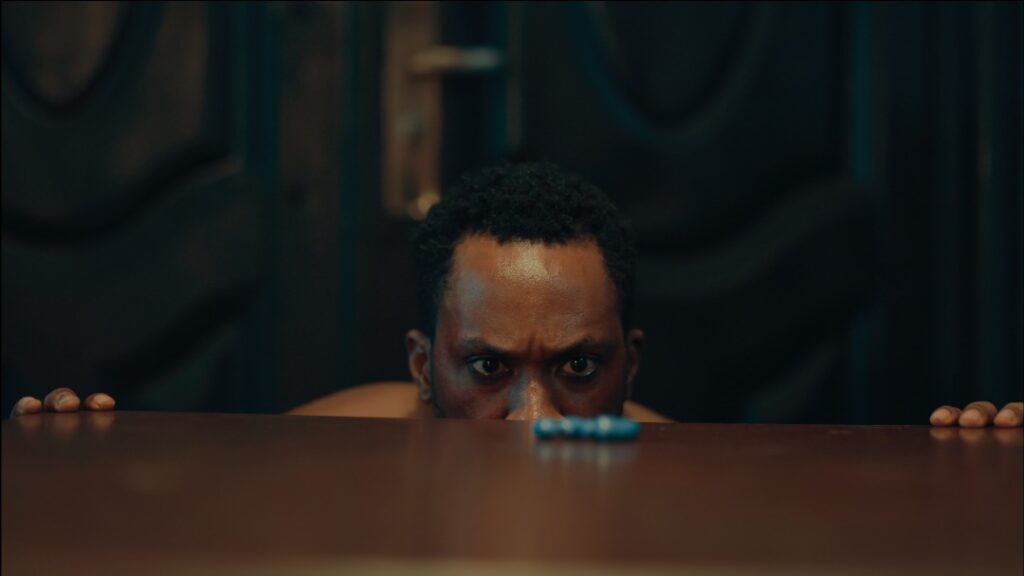
I’ve had the seed of the idea for a long time, but what happens with me is that I sort of just live with the characters. I might not think about it for days; I might think about it for three hours a day. It was just on and off for like a year plus, and then when I finally realized the format I wanted to tell the story in, it was a quick write. But genre-wise, it was just a case of: What is the best way to tell the story I want to tell? What is the most entertaining way? What is the most challenging way for me as a writer, given the amount of things I have written? There are certain things I can write with my eyes closed because I know my pathway around some of these genres, given how frequently I have worked on them. But this one was challenging for me.
We actually had a focus group where we took notes and went back to work on it again. So, to come back to your question, it’s basically saying that the entertainment value is what determined the genre for me. I had the seed of the idea of the story I wanted to tell, but the question was: How best can I entertain people while telling this story? And that’s how we sort of landed here.
Shock Africa: A very quick one for you again, Lani. What’s the moment you’re most proud of as far as this project is concerned?
Lani: First of all, I’m proud of this project on a personal level from the simple fact that I’m known primarily in the industry as a writer. A couple of years ago, I set up the company African Stories Untold. We did a YouTube docu-series, My Birthing Experience. Two years ago, we did our first scripted show, Love and Light, and earlier this year, we released Deeper, both of which are on Showmax. Then, this year, we have a Prime Video movie.
So, first of all, it’s something that we aspired to and put on our vision board as a company. I’m proud of how we were able to achieve this in a short period of time, and I’m able to confidently transition from writer to producer with a project like this. That’s one angle. The second thing is that the demands of the project were a lot more than we had experienced as a company before. I thought it would be a long road, but it was longer than I expected. We had challenges on set and off set, but we were fortunate enough to experience good people along the way. I’m talking about the actors, the crew, the post-production team, and the people that we engaged along the way.
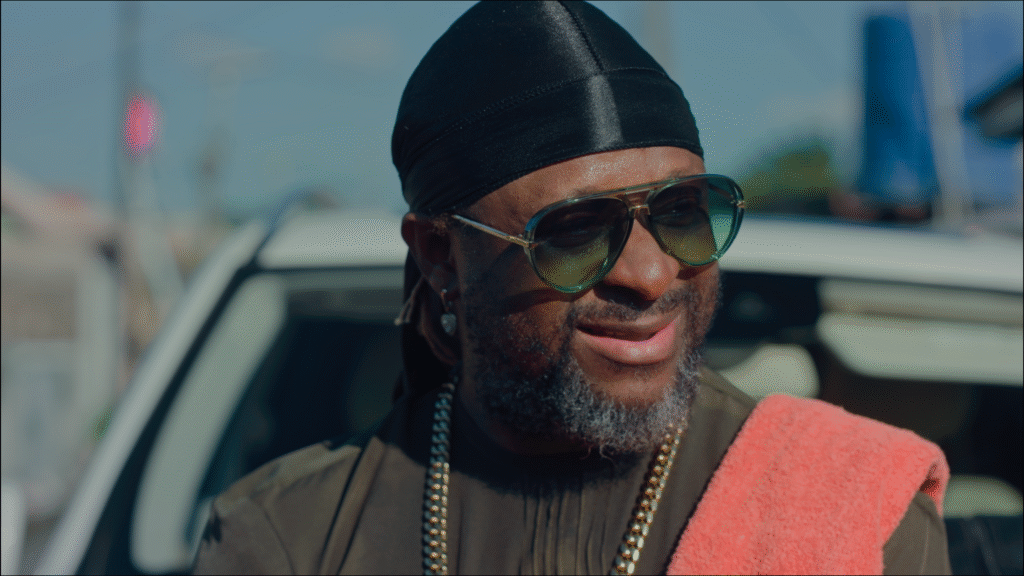
![]() Shock Africa: Thank you for that, Lani. Paul, I understand you’ve worked on two other feature-lengths: What Lies Within and Country Hard. From your perspective, what do you think is different about this new flick and those two? What did you do differently this time?
Shock Africa: Thank you for that, Lani. Paul, I understand you’ve worked on two other feature-lengths: What Lies Within and Country Hard. From your perspective, what do you think is different about this new flick and those two? What did you do differently this time?
Paul: Thank you. So, one of the differences is that on What Lies Within, I was a writer and producer. On Country Hard, I was primarily a writer, director, and producer. On this project, all I am is the director. So, the key difference here is that I didn’t get to write this really cool script. I was just brought on to bring it to life.
Responding to what I did differently, it’s simply not repeating all the mistakes we made while making What Lies Within and Country Hard. You learn not to make the same mistakes over and over again. As a person, if something doesn’t work, I ask myself why it doesn’t work. What can I do differently next time? How do I make things better the next time? If I record a sequence and watch it, I’m very critical. I’m like, “Okay, I like how the actor moves from here to here. They show what I’m trying to say.” The next time I want to shoot something similar, I ask myself what I can do differently. I’m constantly learning and trying to improve my craft.
So, what I did differently in this film is that I tried not to make the mistakes I had ever made as a director and filmmaker.
Shock Africa: That’s brilliant. My next question is also for you, Paul. You said your father is also a twin, right? Did that personal connection influence how you handled the sibling dynamics in the film?
Paul: Thank you. In a way, yes. The thing is, for a long time, as an actor, I find myself studying human mannerisms. Like you now, when you’re talking, I’m unconsciously watching your head movement, watching your shoulder drop, and all of that. I study people a lot, and this is interesting to me. I’ve been watching my dad and his brother over the course of my life. So, on some level, I kind of have an idea of how twins might interact. When they’re quarrelling, when they’re friendly, when there’s nothing to be said, and they’re just sitting together having a good time at a dinner or picnic. On some level, I feel that when I was watching these two talented and really eager young women play these characters, a part of real life was coming to the fore, and that made my job easier.
Shock Africa: Thank you very much for that. My next question is for you, Lani. You identified the themes of family betrayal, identity, and survival. Which of these resonates most with you personally?
Lani: I think it’s identity. I’ll give a little example. In this day and age of social media, I feel like it’s taking people a while longer to be comfortable with who they are. I’ll say two things. I remember when I was younger, going clubbing with people. One day, I’ll never forget, it was a turning point. I just collected my friend’s key and went to sleep in the car because I felt that I was stressing myself. I would rather just stay at home and play video games and chill, regardless of what people say. So, I feel like it takes people a while to be comfortable in themselves and with who they are.
I was talking to someone, and the person said the world is going to a stage where everybody has to figure out their digital identity. Everybody has to post in some way, but you never quite figure out what. I was telling her that at the beginning of every year, I tell myself that I’ll post pictures frequently that year. However, by the time I post my picture on the first of January, I probably won’t post again until September, or until I have a movie. So, I still haven’t figured out my digital identity.
In general, I just feel that’s one thing with me that maybe I struggle with, that thing of identity, even within the film space. When I am introducing myself to people, what should I introduce myself as? Writer? Producer? Showrunner? I say all of that to explain that identity informs how I treat the characters when writing, because I’m not telling you my own life story. It’s not the same issues I experience that the characters experience, but it’s basically this world that we’ve built for them.
Shock Africa: Paul, dark comedy isn’t common in Nollywood, but how did you balance humor with the emotional weight of family conflicts in the picture?
Paul: That’s an interesting question. Dark comedies aren’t necessarily commonplace here, but thankfully, they are commonplace globally, and a lot of the products we have seen have been international, from Hollywood, Bollywood, French cinema, Asian cinema, and many more. So, there’s a lot for me to draw material from to understand how things work, how they try to get the humor across, but also maintain a certain level of dramatic elements when necessary.
There’s a sequence in the film where something big happens, and on paper, it looked somehow. What we did was convey the emotions with pictures and take moments to craft out the rhythm of a major section, depending on how you look at it in the film. Something has happened, but we need to take a moment to process this and come to terms with it, while not letting it override the overarching arc, which is comedy. It was a bit of a process for me and my team, and for Lani, the writer, as well. I am pretty optimistic that we handled it with sufficient grace, tact, and care.
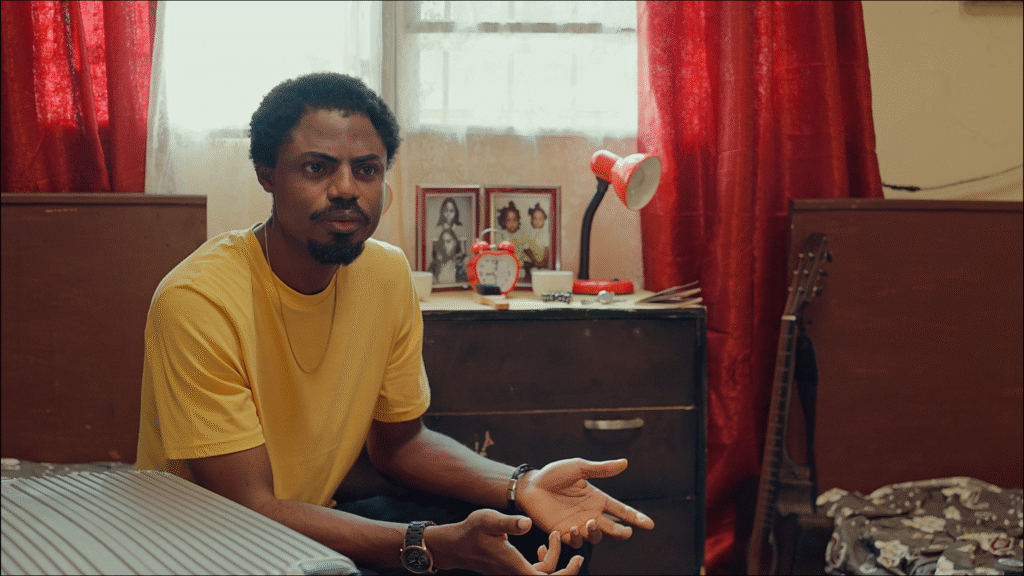
Shock Africa: Awesome. Lani, as a producer, what was your biggest challenge in bringing this picture to the screen on Prime Video?
Lani: I think it might just be having the right team. I think it always goes back to people. It’s putting the team together because there were limited resources. There were options to downsize the scale of what we were trying to do so that we could achieve better, but then it was basically about ensuring that there were people committed to this from a personal point of view.
Thinking about it, because I wrote the project as well, it was also about being able to remove my writer cap and think like a producer, not get emotionally attached and get in the way of what’s best for the project. I think that, from a creative and logistics point of view, I was able to do that quite comfortably. We wanted the story to be as authentic as possible. We wanted to sort of craft a lane for ourselves in this genre. We want people who watch it to be able to talk about it.
It’s also about being able to take advice from the experts we brought in for each role. Though I am the writer and producer, and I know what I want, I should be able to take advice from Paul, the director, to execute what he wants for the project as well. It’s about being able to step aside. The same also goes for costuming. One of the key things is that this is our biggest project, and I didn’t want to mess it up. For one, the people who had faith in us, two, the audience, and three, the people who shared their talents with us. So, it meant sometimes going over and beyond the resources available to us to be able to get the best for the project.
Shock Africa: This last question is a general question for the two of you, and I would like Paul to go first. What are your general thoughts about the state of distribution in Nollywood?
Paul: I think it is still emerging. It hasn’t yet taken any clear-cut shape. I’ve been trying to figure out the aspects of the film business and filmmaking in this region. For almost three decades now, we are still yet to find a lasting solution or system that works to put money in the pockets of creatives and also sustain growth. We are close to doing that, but right now it’s still every man for himself. It is unfortunate, but hopefully we will figure it out.
Shock Africa: All right. Thank you for that. Lani, do you want to respond to that as well?
Lani: Like Paul said, it’s emerging. To tackle complex problems, we need creative solutions. I feel we need more players whose whole business model is distribution.
Shock Africa: It’s been such an honor to have this very wonderful session with you. Thank you.
In Summary
Say Who Die? debuted on Prime Video on August 29, featuring Oiza Abu, Meyi Abu, Baaj Adebule, Mike Afolarin, and more in a gripping dark comedy. The film is currently streaming exclusively on Prime Video.
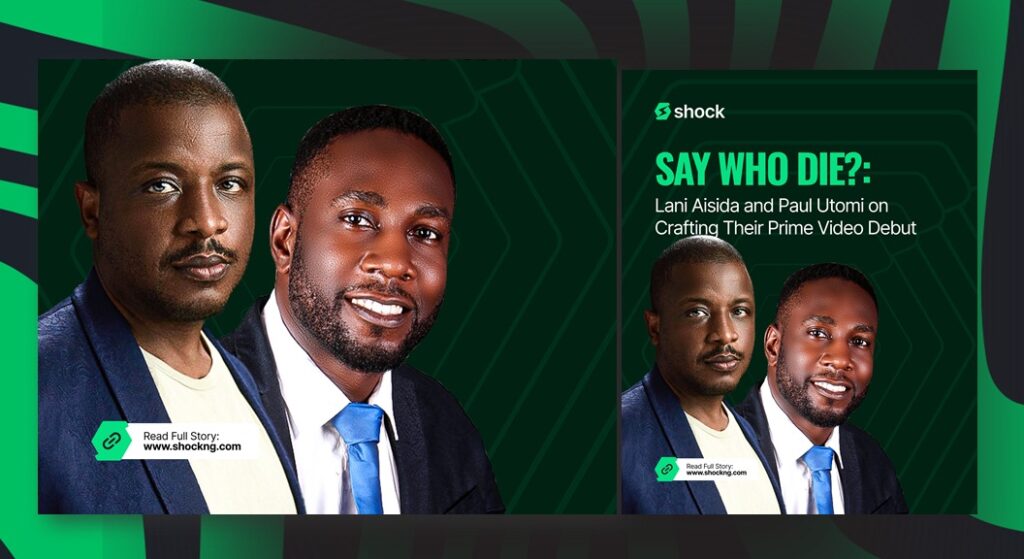
Thanks for Reading.
Shockng.com covers the big creators and players in the African film/TV industry and how they do business.
Let’s be friends on Instagram @Shockafrica
